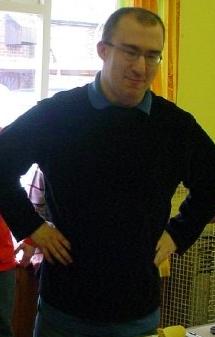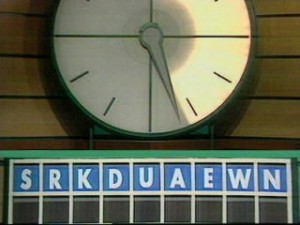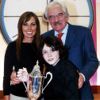Due to persistent vandalism, account creation has been suspended. If you would like an account, please contact Charlie Reams on Apterous.
Countdown:Featured article archives
This is a list of all the previous featured articles that have appeared on the Main Page. The current featured article can be found on the Main Page, see Template:Featuredarticle. Future articles are listed on Countdown:Featured articles.
Contents
March 2009
Ben Wilson (22 March 1983-) first appeared on Countdown in Series 46, his first programme being broadcast on 6 November 2001. He defeated namesake Peter Wilson 101-70 in his first show, before winning 5 more games and becoming one of only five viscounts in Countdown history.
He returned for the series finals as number 1 seed, beating fellow Lincoln resident Simon Cartwright 83-68 in the quarter-finals, and Scotland's Paul Ryan 101-80 in the semi-finals after a close and tense game. In the grand final on Christmas Day against Steve Sandalls, the scores were level until round 9, but Ben built up a lead of 17 points over the next two rounds with an excellent six-small numbers game, and the word BONNIES. A series of poor rounds, including offering MACE for four, missing GYRATED and making a mistake on the final numbers game put Wilson 1 point behind going into the conundrum, but, he was able to solve the conundrum in 5 seconds to become champion of the 46th series, and the first champion of the 15 round format. Aged just 18 at the time, Ben also has the distinction of being the first ever series champion of Countdown to have been born after the show's debut on Channel 4.
Wilson was invited back for Championship of Champions XI in January 2003, where he was paired against Northern Ireland's Geraldine Hylands in the first round. Wilson scraped through, winning 94-91, but was ultimately beaten in the quarter-finals of the tournament by Tom Hargreaves, by a score of 131-98. At the time, this game set the record for highest aggregate score in a 15-round game (229), and 98 still remains one of the highest losing score of all time. Thr aggregate record was not broken until the following Championship of Champions tournament when Mark Tournoff beat Matthew Shore by 124 - 117.
Wilson is notably the organiser of Countdown in Lincoln and won the first ever meeting of Countdown in Redhill. Wilson is also a tournament Scrabble player and won his first tournament (Peterborough) in 2008.
November 2008
A letters game is one of the 11 rounds during a 15 round game in which the contestant chooses 9 letters by selecting either a vowel or a consonant until there is a total of 9 letters. The player in the champions chair chooses 6 letters games and the challenger chooses 5, but gets an extra choice of numbers. The player can choose the letters in any order, but the selection must include at least 4 consonants and 3 vowels, hence there are only three valid choices in modern Countdown: 3 vowels, 6 consonants; 4 vowels, 5 consonants and 5 vowels, 4 consonants.
When the show was first broadcast, and for a number of years, contestants could choose as many vowels and consonants as they liked, which often led to poor selections where only 4's and 5's were available. Since then the rules have been changed. In the original 9-round format, there were 6 letters games.
A player scores points on a letters game by writing down a valid word within the 30 seconds. This word must be in the current New Oxford English Dictionary, but not a proper noun, nor an abbreviation. Players can use each lettter only once, but can use a letter more than once if it appears more than once in the selection. For example from EEEECDLST the player could play SELECTED, which uses three E's, but there are four E's in the selection. Words score 1 point per letter, but 18 points for a nine-letter word.
Unlike the game of Scrabble, Countdown does not allow all nouns to have a plural form. In particular, a mass noun is a noun that that does not logically have a plural, like GUNFIRE or HEALTH -- in standard English they would rarely be used in the plural. This system has been the cause of some controversy and confusion. Since the start of Series 49, the rules have been refined to allow the plural of some mass nouns; for example, CONGEES was allowed in Series 58 because it was argued that one could ask for "two congees". Again this rule has been enforced with some inconsistency, and words like OPALINES and CARMINES have been allowed on some occasions and not others.
October 2008

Episode 4121 featured Matthew Shore and Mark Tournoff in the Championship of Champions XII first quarter-final. Shore had just beaten the previously unbeaten Chris Cummins and Tournoff had beaten Steve Graston. The game started gently with a six and three sevens, before Tournoff beat his opponent on the numbers game. After another seven, the game came alive with PAINTIEST in round 7, followed by OVERRUN and QUIETEN. A difficult numbers game failed to beat either player, and Tournoff was on a score of 86 out of a possible 86, while Shore was on 76, only dropping points on the first numbers game. In round 11, both players got another nine with HERNIATES and Tournoff had 104 out of a possible 104. In the next round, Tournoff missed PISTEURS opting for the invalid PURSIEST instead, and in the next round had FLOOK disallowed, although Shore had FORMAL for six anyway. After an easy numbers game ((25×10)+4+1) the players were on 117 and 114 with Shore leading by 3 points. The highest ever losing score was 111 by David Williams, losing to Chris Wills in the Championship of Champions XI and both players had already surpassed that, meaning that even if neither player got the conundrum, Tournoff would set the new highest losing score record with 114. Des Lynam informed them of this and the conundrum SILLYQUOO was revealed, solved in 1 second by Tournoff won won the game 124 - 117, 117 is still the highest ever losing score in a game of Countdown.
September 2008
Julian Fell was the winner of Series 48 and ispx widely considered to be among the greatest Countdowners of all time. He holds a cornucopia of records, including the highest single score (146) and the highest octochamp score (924). He is particular renowned for his astonishing word knowledge, including definitions, coupled with fast conundrums. His numbers strength is often underestimated in comparison to the other disciplines.
His debut came on Wednesday 16th October 2002, when he posted an impressive 117. Six more centuries followed, and by the following Friday only Carl McDermott stood between Fell and octochampdom. This game is remembered as one of the greatest drubbings in Countdown history, as Fell racked up 138, winning by 109. His place as #1 seed and favourite for the series was assured, and his feat of eight centuries in eight heats has been matched only by Series 57 contestant Craig Beevers.
Fell won his quarter-final against Mike Brown with ease, beforegetting four nines against Danny Hamilton in the semi-final. Fell got SALMONIDS, DEPORTING, INGATHERS and DEFLATION and had 146 before the conundrum THEIRCOPY but failed to solve it and was left with 146 points, still 8 points better than the second highest score, 138 by Fell and Mark Tournoff. Fell went onto win the final against Grace Page after spotting MANTICORE in the first round, which Page missed.
Fell returned for the Championship of Champions XI as the favourite and won his first match against Terence O'Farrell with ease before losing a nail-biting quarter-final to Graham Nash 120-109. Despite losing, Julian maintained his streak of scoring 100 in every game. Since this quarter-final, Julian has filmed just once, a special against Chris Wills which he won 100-92 on a crucial conundrum. 100 was Julian's lowest ever score on Countdown.
August 2008
Des chiffres et des lettres (literally numbers and letters) is a French television programme. It was created by Armand Jammot and tests the numeracy skills and vocabulary of two contestants. It's the oldest TV programme still broadcast on French Television, and is notable in the UK for being the original version of Channel 4's Countdown. It was first known as Le mot le plus long (the longest word) because the numbers game had not yet been invented.
The game debuted in 1972. It is broadcast on France 3 and is currently presented by Laurent Romejko, Arielle Boulin-Prat and Bertrand Renard (the latter two check the existence of the words proposed by the contestants; Renard also provides solutions to the number problems that the contestants fail to solve). The show is also seen throughout the world on TV5.
The format is similar to the English version, it currently has 14 rounds which are identical to the rounds used in the 14 round format that was used for Grand finals up until Series 46 when the 15 round format was brought in, apart from the 14 rounds are not in the same order. Other notable differences are that when one player has a longer word than the other player, only the player with the longer word declares, and there are no conundrums but rather duels which involve some sort of mental calculation or anagramming feat, but is not simply a 9-letter anagram. Other differences include that players get 9 points for a 9-letter word and not 18, and players get nine points for a correct numbers game, and six points for any other solution, no matter how far away the solution is from the target. Finally if a player offers an invalid nine-letter word (or any word that's longer than the opponent's word) the opponent gets nine points no matter what the length of his own best word was.
July 2008
Conor Travers became the youngest ever series champion by winning Series 54 in 2005. He won his first game with a score of 99, followed by 111 against John Archer and 99 against Geoff Alderman. His remaining 5 games were all centuries, with a top score of 124 and a low score of 111. Out of the 8 games of his octochamp run, only two were less than 110. He beat Daniel Peake by 69 points in the quarter-final, Paul Howe by 24 points in the semi-final before meeting Matthew Shore in the Series final. There he won narrowly 98 - 83 to become the youngest ever Series champion, at 14 years old. He returned for CofC XII beating John Hunt and John Brackstone in the first two rounds. Considered one of the favourites after his 890 aggregate as an Octochamp, he lost 118 - 102 to the eventual winner Paul Gallen in the semi-final. In 14 games, Conor's lowest score was 98 and his average was 110.4 points per game. After losing to Paul Gallen, he appeared on Countdown's 25th anniversary special against Chris Wills and won the game 69 - 58 in a disappointing contest.
June 2008

The Championship of Champions XI was a Championship of Champions tournament held in 2003. It featured contestants from Series 42 to Series 48, including 7 series champions although Stuart Wood was unable to make the recordings, and John Rainsden the Series 44 runner-up took his place. The tournament featured some excellent scores, most notably David Williams' losing score of 111 as Chris Wills beat him 113-111, the highest ever losing score at the time. Also of note were episodes 3400 and 3401, Ben Wilson vs. Tom Hargreaves and Julian Fell vs. Graham Nash. In both episodes the total of the two players' scores was 229, the highest ever joint total at the time. The final between Wills and Nash was a close affair, and matters weren't helped by two impossible numbers games. Wills beat Nash with GAMBADE but Nash struck back with PENSIVE and METALS. After round 14, a numbers game where it was impossible to get within ten, the scene was set for a crucial conundrum. The conundrum was OVERSPADE and neither player could find EAVESDROP during the thirty seconds. Nash punched the air and shouted "yes!" - he'd won the tournament unbeaten with a final score of 79-73.
May 2008

Countdown is a British game show presented by Des O'Connor and Carol Vorderman, and the subject of this wiki. It was the first programme aired on Channel 4, and over fifty series have been broadcast since its debut on 2 November 1982. With over 4,000 episodes, it is one of the longest-running game shows in the world. The programme was presented by Richard Whiteley for over twenty years, until his death in 2005. His position was taken over by Des Lynam, who retired from the show on December 22 2006 and was replaced by Des O'Connor on January 2 2007. A celebrity guest also features in every programme, and provides a brief interlude before the first advertisement break.
April 2008
Jon O'Neill was a contestant in Series 53, and at fifteen is one of the youngest people ever to become an octochamp. While proficient at the words, O'Neill was particularly noted for his astonishing ability at the "4 large" selection in the numbers game, and is often considered among the greatest of all time in the discipline. After eight convincing wins, he reached the series semi-finals, losing to eventual series champion John Mayhew, and in 2006 return for the Championship of Champions, where he was again defeated -- this time by Jack Welsby. O'Neill also holds the dubious honour of being the only person to attend all eight of the unofficial Countdown tournaments since their inception in 2005.





